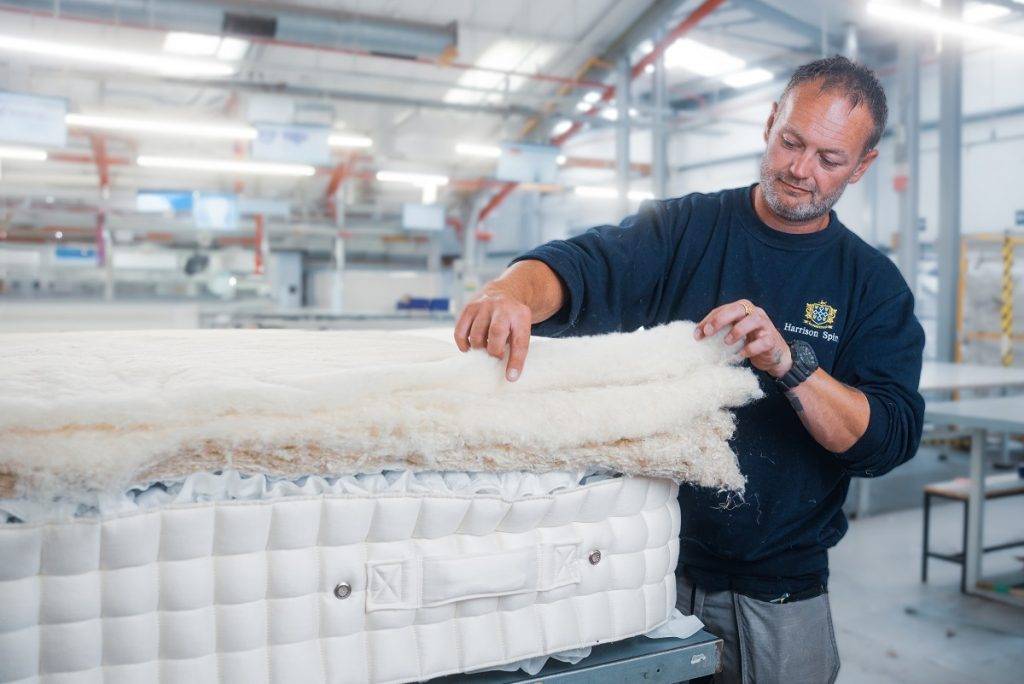News
Harrison Spinks announces new sustainability-focussed initiatives in Impact Report
Corporate member Harrison Spinks has announced a raft of sustainably-focussed initiatives in its new Impact Report from both the main beds business and its components manufacturing company to further improve the planet whilst enriching the local environment and enhancing colleagues and communities.
The business, which employs around 500 people and is already one of the largest growers of hemp in the UK, will increase its flax crop from 20 to 120 acres to replace cotton – not only is the crop more suitable for the British climate, there is no requirement for pesticides or irrigation for it to grow.
Meanwhile its Yorkshire-based spring manufacturing business has introduced a patent-pending, pocket coiling machine that reduces energy consumption by 60%, as well as minimising raw materials needed in the process.
Manufacturing production within the beds division at the 180-year-old company has moved to a four-day working week with longer production shift patterns after identifying the benefits of an improved work life balance – which they achieved without a reduction in overall output – and central operations has moved to a 4.5-day week, leading to increased productivity and reduced direct and indirect emissions.
Harrison Spinks’ partnership with Scottish luxury accessories manufacturer Alex Begg is now enabling the business to upcycle clean, high-quality cashmere offcuts to replace the virgin cashmere wool in its mattress fillings, also leading to lower transport emissions.
Last year alone, the company’s hemp crop absorbed over 3,000 tonnes of CO2 emissions – which is equal to all of its annual Scope 1 and Scope 2 emissions.
Further changes to improve its production, CO2 emissions, and local biodiversity have been announced within the newly-launched Impact Report. These include:
- Further investment in weaving its own mattress ticking fabric from naturally fire-retardant wool, covering 100% of production needs and saving 28 tonnes of fire-retardant chemicals being used each year
- Creating its own pocket springs through efficient wire-drawing processes that save 330,000kWh of energy each year
- Becoming members of the UN Global Compact – the world’s largest corporate sustainability programme
The business is also boosting the local natural habitat, shifting from overseas carbon offsetting and investing into programmes in Britain, such as the Wild Ingleborough initiative led by Yorkshire Wildlife Trust to help restore the natural habitat and combat climate change.
Harrison Spinks has committed to becoming Nature Net Positive across all operations and as part of this the two farms are working towards being fully organic by September 2025. It is also planting 2,750 metres of native hedgerows in Yorkshire to support animal welfare and encourage wildlife, while 47 acres of Ings grassland on the farm is left unstocked in spring to allow ground nesting. Furthermore, a higher stewardship grant from Natural England has enabled 33 acres of wildflower, bird, and butterfly margins to be created and maintained.
Simon Spinks, chairman at Harrison Spinks, said: “Our Impact Report details how we’ve adapted our business in the last year and the fundamental commitments we’re adopting for the future to make beds and components in the most responsible way possible.
“We are a business that’s been recognised with seven King’s and Queen’s Awards, including two for Sustainable Development, so we understand the importance of playing our part in making the world happier and healthier.

“We’re making some big commitments, going from 20 to 120 acres of flax crop production – allowing us to replace cotton with Yorkshire-grown luxury mattress fillings – and we have a patent pending on a coil manufacturing machine which reduces energy consumption by 60%.
“This machine was designed and built by us here in Leeds and we aim to share this technology in our sector and beyond to allow others to benefit from these energy savings.
“From using renewable energy at our Leeds manufacturing site to our partnership with children’s bed charity Zarach, providing them with 20 mattresses every month to give every head a bed, we want to make sure we’re supporting local communities and the environment.
“Owning a farm gives us a unique and unbreakable connection to nature, and that’s why we’ve taken more steps to monitor exactly how we’re affecting the local environment, from making sure we lower emissions, right down to encouraging rare bird species onto our farms.
“We have been refining our manufacturing processes to be more responsible, and we’re now working on industry-leading ways to re-purpose clean waste back into production and looking further ahead to re-purpose our mattress components.”